Political Prisoner Remains Incommunicado For Six Months In Evin Prison

Nasim Simiari, a political prisoner detained in Iran, has been held incommunicado in the women's ward of Evin Prison for six months.

Nasim Simiari, a political prisoner detained in Iran, has been held incommunicado in the women's ward of Evin Prison for six months.
Simiari faces a series of charges, including "collusion and conspiracy to act against the country's security, setting bombs in public places, and disrupting public order."
On May 18th, Simiari was taken into custody by Intelligence agents of the Islamic Revolutionary Guard Corps and transferred to a detention center within Evin Prison.
Following her arrest, authorities conducted a search of her residence, seizing personal belongings, including identification documents, mobile phones, a computer, money, gold, watches, and clothing belonging to her and her family.
After enduring two months of interrogation and detention in a separate cell, Simiari was moved to another solitary cell. A source close to Simiari's family revealed that prior to her transfer, she was coerced into a forced confession to camera.
Despite being transferred to the women's ward of Evin Prison in October, Simiari remains in detention without a court hearing or a verdict. It has been a recurring practice in the Islamic Republic to force detainees to provide forced confessions, subsequently leading to verdicts against political prisoners, a practice strongly criticized by human rights organizations.
Born in 1988 in Tehran, Simiari holds a degree in architecture and operated a women's beauty salon in Tehran before her detention. Her story underscores the ongoing concerns regarding human rights and due process in Iran's judicial system.
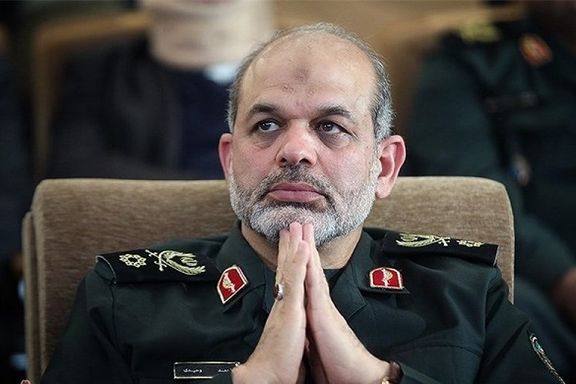
Iran's interior minister has appealed to the Taliban to take more measures to ensure Iran's water rights from the Helmand River, known as Hirmand in Iran.
The river plays a vital role in sustaining both Afghanistan and Iran, serving as a critical source for agriculture and drinking water. However, it has been a persistent source of tension between the two neighboring countries.
Iran has long accused Afghanistan of obstructing the river's water flow through the construction of dams, a claim vehemently denied by Afghan authorities.
During a Monday meeting with Abdul Ghani Baradar, the Deputy Prime Minister for Economic Affairs in the Taliban government, Ahmad Vahidi also engaged in discussions with a Taliban official on matters related to border security, counterterrorism, and creating conditions for the return of Afghan refugees, as reported by the IRNA state news agency.
Baradar, along with a 30-member delegation of Taliban officials, arrived in Tehran on November 4 and is expected to travel to other provinces in Iran, according.
Vahidi said during the meeting, "The issue of water casts a shadow on the medium-term and long-term plans of the two countries, and efforts must be made to resolve the problem."
Tensions regarding the Helmand River have persisted since the spring, and in early June, a clash between Iranian border forces and the Taliban resulted in the death of at least one Iranian soldier.
In the Taliban’s statement, it is said that Baradar requested that Iran release Afghan prisoners accused of minor crimes from prisons and transfer other Afghan prisoners to the Taliban government.
Iranian officials estimate that there are five million Afghans in Iran, with only 780,000 having refugee status, while the majority are undocumented. Some estimates even reach as high as eight million.
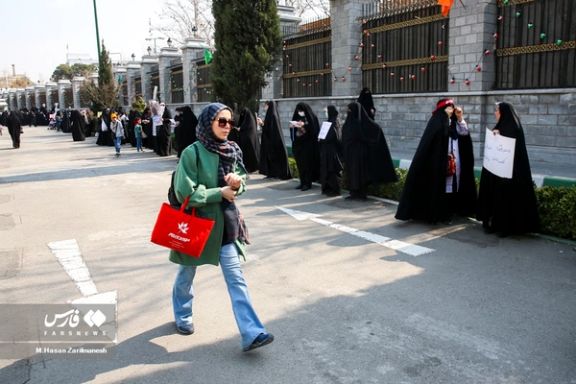
An official from Supreme Leader Ali Khamenei's office has tried damage control following remarks by a female hardliner, which risk alienating even regime supporters.
“This country belongs to Hezbollahis,” said Mansooreh Masoumi-Asl, an aspiring politician with close ties to the ultra-hardliner Paydari Party on live TV on Saturday. The context clearly indicated that she was demanding the total exclusion of all but her own party from the media and politics including other hardliners and conservatives.
Mehdi Fazaeil, a member of Khamenei’s office who has been responsible for publishing his writings for several years, responded to Masoumi-Asl by quoting Khamenei’s remarks about the revolution and those who “own” it.
“The Leader of the Revolution: This is a divine revolution, and its pillars are the people… No one, no group, can and should lay claim to owning this revolution …This revolution is owned by the people,” is a quote from a Khamenei speech in June 2008 that Fazaeli posted on X Monday evening read.
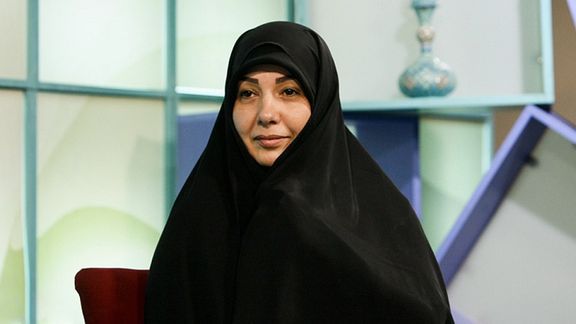
However, Khamenei had also said in a speech that the country belongs to hezbollahis, which seems to have been the inspiration for Masoumi-Asl’s statement two days ago.
“This country is the country of hezbollahis, and its future will be built by these hezbollahis and revolutionary and pious forces. Whenever a problem occurs, they should come and solve it. God willing, this will be the case,” Khamenei had said in September 1995.
The term "Hezbollah," originally employed to denote the Islamic Republic's revolutionaries in their struggle against perceived evil forces, has never held official political party status. In common usage, "hezbollahi" has evolved to describe fervent supporters of the regime and Supreme Leader Ali Khamenei.
Hezbollah and hezbollahi (belonging to Hezbollah) became part of the political jargon in 1979, when Islamist revolutionaries described themselves as hezbollahi against the liberal who were soon excluded from the government.
Masoumi-Asl, who is very active on social media and is often invited by the state broadcaster (IRIB) to comment on an array of topics, is a member of the central council of the Paydari-affiliated Strategic Network of Islamic Revolution’s Helper (SHARIAN). The group held its first general meeting in early March.
Iranian media say the group which includes many officials of President Ebrahim Raisi’s administration, as well as deputy parliament speaker Mojtaba Zolnour, seeks to oust the incumbent speaker of the parliament, Mohammad-Bagher Ghalibaf and his supporters in the upcoming March elections, and to take full control of the parliament.
The group’s activities have caused serious disputes between the Ghalibaf and the Raisi camps, Entekhab, a moderate conservative news website wrote Sunday.
“Our Iran is now at the center of a serious and dangerous development, and we witness a new episode of extremist behavior and deviations by hardliners. [They believe] whoever thinks differently should collect their things and get out [of the political scene],” Mostafa Faghihi, Entekhab’s chief editor, warned in a series of tweets.
Vahid Ashtari, an independent hardliner whistle-blower, tweeted that there are many theoreticians behind the phrase, ‘The country belongs to hezbollahis’ and several billions have been spent to promote this view. Many in power share this view, he said.
Ashtari who is an ardent supporter of the Islamic Republic but critical of most of the ruling cast and their corruption, also emphasized that limiting the criticism to Masoumi-Asl was “reducing the importance of the matter”.
“She will soon be given a good position [in the government] or become a lawmaker … She will mature a little bit and learn like others that she doesn’t have to say out loud everything that she believes in,” Ashtari wrote.
“Don’t mislead the people if you know where the roots of such a belief are and how it has affected policymaking, the money that has been spent, and the consequences it has had and tell the truth about this issue,” he added.
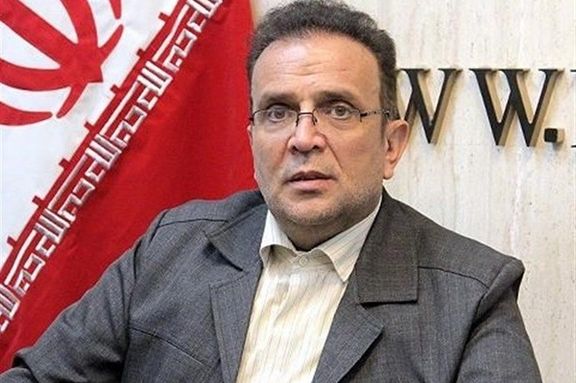
An Iranian member of parliament has voiced doubts regarding Supreme Leader Ali Khamenei's call to close off supply routes for oil and resources to Israel.
Mahmoud Abbaszadeh said that achieving the goal from “areas controlled by the Axis of Resistance may be unfeasible, and some regional reactionary countries might resist efforts to cut off oil and resources to Israel.”
Axis of Resistance is a term coined by the Islamic Republic to refer to its proxy forces in the region including, Palestinian militant groups, the Syrian regime, the Lebanese militant group Hezbollah and other factions.
Khamenei on Wednesday made an appeal to Muslim countries, urging them to halt oil and food exports to Israel, while demanding an immediate end to the bombings in the Gaza Strip.
"The bombings on Gaza must stop immediately ... the path of oil and food exports to the Zionist regime should be stopped," Khamenei told a group of students in Tehran, according to Iranian state media.
Israel, in retaliation for an attack on October 7 that claimed many lives and resulted in hostage situations, has vowed to take action against Hamas, which is backed by Tehran.
Iran is one of Hamas' biggest backers, supporting the group, proscribed by countries including the US and UK, financially and militarily.
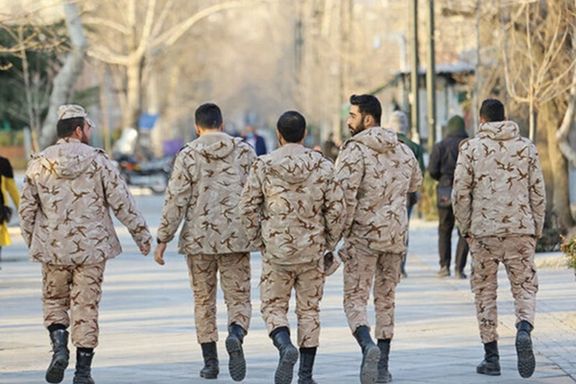
Iran has introduced a new salary structure for its soldiers, taking into account various factors such as the place of service, marital status, and the number of children.
Soldiers will now receive variable monthly salaries ranging from $60 to a maximum of $180, according to Hossein Zahedi, the Deputy of Public Military Service. The current minimum wage in Iran is around $150 a month with the average income between $150-250.
The change follows the legal requirement that soldiers should receive a minimum of 60% of the minimum official employee salary and a maximum of 90%. Zahedi explained that the aim is to ensure fair and targeted compensation for the country's military personnel.
In addition to the new salary structure, Zahedi announced that the service duration for soldiers has been revamped, meaning soldiers serving in hostile border areas may now have their service periods reduced to as little as 14 months.
Unofficial data suggests that Iran has approximately 400,000 to 500,000 conscripts, with the majority serving in the traditional Army. Some individuals with connections have the opportunity to serve in the Revolutionary Guard, which offers better conditions. There are also conscripts assigned to national police units, often engaged in suppressing protests.
Under Iran's constitution, all men over 18 years of age are required to complete approximately two years of military service. Failure to do so restricts their ability to apply for passports or engage in legal business activities. Leaving before end of service is also punishable under law as charges of 'desertion'.
This year's latest budget showed an ongoing priority given to the military while the rest of Iranian society fell to the worst in decades. Research showed 21 percent of the budget allocated to military and armament goals, while the IRGC got a huge 31 percent of the budget with the army gaining just 11.5 percent of the total budget. However, veiled in secrecy, the budget figures are not transparent under the regime's watch.

Iran's Economy Minister has declared that the nation is experiencing one of the most prosperous periods of trade and investment cooperation with China.
Speaking at the Iran-China 2023 Trade Conference held in Shanghai on Monday, Ehsan Khandouzi expressed hope that the optimistic outlook would soon manifest through practical projects benefiting the Iranian populace, IRNA state news agency reported.
His comments come as Iran is offering substantial price reductions to its principal oil customer, China. Iran has been supplying its oil to Chinese independent and small refineries, known as teapots, with payment delays extending up to three months.
Reports from Reuters and Bloomberg indicate that Chinese teapots are securing Iranian oil at a discounted rate, with savings amounting to between $10 and $12 per barrel. Also, international tanker tracking companies have identified a significant volume of Iranian oil being facilitated to China through intermediaries and brokers, often via ship-to-ship transfers. These cargoes are frequently rebranded as Malaysian oil, and these transfers take place in international waters with seemingly no interference from Malaysia.
Consequently, Iran's approach extends beyond offering price discounts to final oil purchasers; it involves allocating undisclosed portions of its profits to intermediaries and tanker companies involved in these diversionary oil export operations. As a result, the actual revenue realized by Iran may be closer to $40 per barrel, a substantial difference from the initially presumed $70.
In addition to such strategies, Iran engages in a practice of bartering a portion of its oil for Chinese goods. This barter arrangement is partly a response to US sanctions targeting Iran's oil exports and banking sector, which complicate direct foreign currency transfers from Chinese buyers to Iran.